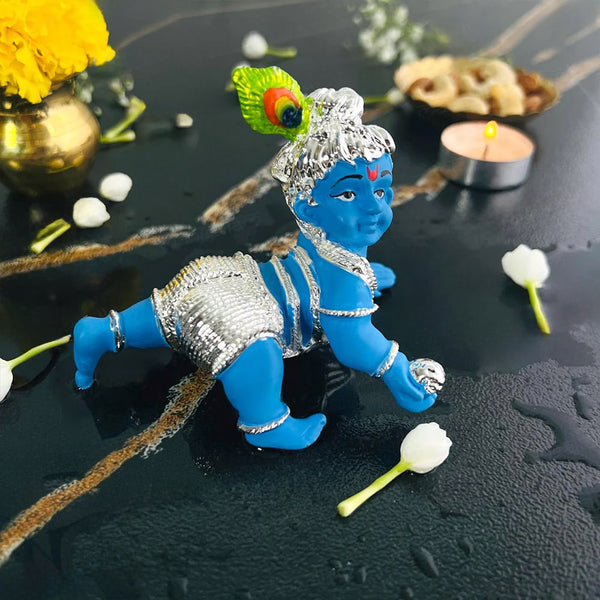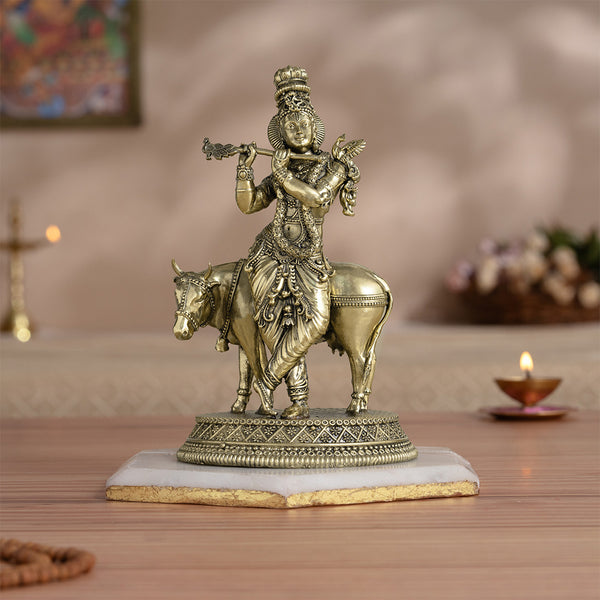Lord Krishna, revered as a symbol of divine love and wisdom, occupies a place of immense significance in Hinduism. His life, brimming with tales of heroism, devotion, and charm, continues to inspire and captivate people around the world. From his playful childhood in Gokul to his profound teachings in the Bhagavad Gita, Lord Krishna's story is a rich tapestry of divine grace and human experience.
Yet, among the many facets of Lord Krishna's life, one intriguing aspect often sparks curiosity: the identity of his father. This question isn't merely a matter of historical record; it delves into the heart of two remarkable figures whose lives were profoundly intertwined with Lord Krishna’s divine journey.
Lord Krishna's parentage reveals a beautiful blend of earthly and celestial elements. His story encompasses not just one, but two father figures, each contributing in unique ways to his extraordinary life. In exploring the roles of Nanda, the loving foster father, and Vasudeva, the biological father, we uncover a deeper understanding of divine love and the essence of selfless devotion.
In Lord Krishna's life, two figures stand out prominently: Nanda, the beloved cowherd chief of Gokul, and Vasudeva, the noble Yadava prince. Their stories are interwoven into the fabric of Lord Krishna's divine narrative, each contributing in their own remarkable way to the journey of this revered deity. The question of Lord Krishna's father is not merely a matter of lineage but a gateway into understanding the profound and multifaceted nature of divine love and earthly devotion.
Nanda’s humble abode in Gokul, where he lovingly raised the divine child, and Vasudeva’s brave efforts to protect and nurture Lord Krishna amidst a backdrop of cosmic prophecies and dangers, both play crucial roles in this divine saga. Each father figure offers a unique perspective on Lord Krishna’s upbringing and the roles they played in shaping his extraordinary path.
So, who is the true father of Lord Krishna? To answer this, we need to explore both Nanda and Vasudeva, understanding their distinct contributions and the deep symbolism behind their roles.
Nanda: The Foster Father's Unconditional Love
When we see Lord Krishna’s early days, one figure truly stands out: Nanda Baba, the beloved cowherd chief of Gokul. Picture Gokul as a peaceful, charming village where life flows gently with the rhythm of nature—cows lazily grazing, the air filled with soft, melodious sounds, and the lush green fields stretching as far as the eye can see. Into this tranquil haven came Lord Krishna, not as a prince from a royal palace, but as a divine infant in need of tender care and protection.
Nanda and his wife, Yashoda, lived in this serene village, and their lives were transformed with Lord Krishna’s arrival. The adoption of Lord Krishna into their family was no ordinary event; it was a divine blessing and a pivotal moment in their lives. Nanda and Yashoda’s home, once a simple abode of a cowherd family, turned into a sacred space where the Supreme Being himself was nurtured. They didn’t merely take in Lord Krishna—they embraced him with all their hearts, offering him the warmth, care, and love that only devoted parents can provide.

Nanda’s affection for Lord Krishna was exceptional. He saw Lord Krishna not just as an adopted child but as a divine gift from the heavens. This wasn’t just about raising a child; it was about cherishing a precious presence that had arrived to bring joy and divine essence into their lives. Nanda and Yashoda’s devotion to Lord Krishna was boundless. They provided him with more than just physical care; they surrounded him with an atmosphere of love, happiness, and spiritual fulfillment.
What makes Nanda's role so remarkable? It’s his unconditional love and care. Even though he and Yashoda only learned about Lord Krishna’s divine nature later on, their love never wavered. They treated him with the same affection and dedication as if he were their own flesh and blood. This act of selfless love highlights a profound truth: true parenthood goes beyond biological connections. It’s about nurturing and loving a child with all your heart. Nanda and Yashoda’s devotion made Lord Krishna’s early years not just safe but filled with joy and divine bliss.
In essence, Nanda’s role in Lord Krishna’s life is a beautiful testament to how love and devotion can transform an ordinary household into a haven of divine grace. Their unwavering affection and care provided Lord Krishna with a childhood that was not only protected but enriched with the kind of love that makes divine stories resonate through the ages.
Vasudeva: The Biological Father’s Sacrifices
Switching gears to another key figure in Lord Krishna’s life, we encounter Vasudeva, the biological father of Lord Krishna and the righteous prince of the Yadava clan. Vasudeva's story is one of unparalleled bravery and sacrifice, intricately connected to the prophecy that loomed over his and his wife Devaki’s lives.
The tale begins with a somber prophecy delivered by a celestial oracle: the tyrannical ruler Kamsa, who had usurped the throne of Mathura, would meet his downfall at the hands of the eighth child born to Vasudeva and Devaki. This prophecy, as ominous as it was, marked the beginning of a dramatic saga. Kamsa, in his fear and desperation to cling to power, imprisoned Vasudeva and Devaki, sealing them away in a dark dungeon to prevent the prophecy from coming to fruition.
Despite the grim conditions and the constant threat of death, Vasudeva’s courage and determination never wavered. The birth of Lord Krishna was a moment of both joy and peril. As the baby emerged into the world, the darkness of the dungeon was pierced by an extraordinary light, signaling the arrival of the divine child. Kamsa, ever vigilant, was intent on seizing the newborn, but Vasudeva was resolute in his mission to protect his son.

In a daring and miraculous feat, Vasudeva braved torrential rains, an overflowing Yamuna river, and the heavily guarded prison walls to transport baby Lord Krishna to the safety of Gokul, the home of his devoted friend and foster father, Nanda. This journey, which seemed like a passage through a storm both literal and metaphorical, was marked by divine intervention and Vasudeva’s sheer resolve. The river parted to allow Vasudeva to cross, and the night was illuminated to guide him through his perilous quest.
Vasudeva’s role in Lord Krishna’s early life is a testament to the depth of parental love and sacrifice. His actions reflect not just biological ties but the profound responsibilities of protecting and nurturing a child amidst the gravest dangers. While Nanda’s love was nurtured in the peaceful pastures of Gokul, Vasudeva's story underscores the protective and courageous aspects of fatherhood. His relentless efforts to safeguard Lord Krishna, despite overwhelming odds, highlight a father’s devotion that goes beyond mere bloodlines.
In Lord Krishna's life, Vasudeva stands as a symbol of unwavering duty and sacrifice, providing a powerful contrast to the nurturing love of Nanda. Together, their stories weave a rich tapestry of divine purpose and parental devotion, each contributing uniquely to the remarkable journey of Lord Krishna.
The Symbolism of Dual Fatherhood
The dual fatherhood of Lord Krishna—Nanda and Vasudeva—offers a fascinating glimpse into the spiritual and symbolic dimensions of Lord Krishna’s life. On the surface, it might seem like a simple tale of two fathers, but the symbolism runs much deeper.
Lord Krishna’s dual paternity can be seen as a representation of divine love that transcends all boundaries, including those of biological connections. Nanda represents the nurturing, unconditional love that shapes Lord Krishna’s early life, while Vasudeva embodies the protective, sacrificial love that ensures his survival and future. Together, they offer a holistic view of divine love and parental roles.
The story encourages us to see beyond biological connections and appreciate the broader concept of parenthood, which encompasses care, love, and sacrifice. It suggests that true parenthood is not confined to blood relations but is defined by the depth of love and commitment one shows.
Narratives and Traditions Surrounding the Fathers
Exploring various scriptural and mythological accounts enriches our understanding of Nanda and Vasudeva’s roles in Lord Krishna’s life. In the Bhagavata Purana, the tale of Lord Krishna’s birth, his journey to Gokul, and his upbringing under Nanda’s care are narrated with great reverence. These stories are not just historical accounts but are celebrated in rituals and festivals across India.
Festivals like Janmashtami, which marks Lord Krishna’s birth, often highlight the significance of both Nanda and Vasudeva. Devotees reenact episodes from Lord Krishna's early life, celebrating both the sacrifice of Vasudeva and the love of Nanda. Such traditions keep the stories alive, reminding us of the profound impact of these two figures on Lord Krishna’s life.
Crawling Laddu Gopal Murti - Silver Plated Brass Standing Krishna Statue with Cow (7 Inch)

Conclusion: Embracing the Celestial Lineage
In wrapping up, the story of Lord Krishna’s fathers—Nanda and Vasudeva—is more than a historical account; it’s a spiritual journey that reflects the essence of divine love and parenthood. Understanding their roles provides a deeper appreciation of Lord Krishna’s life and the values he represents.
The universal appeal of the father-child relationship in spiritual narratives teaches us about the nature of love, sacrifice, and nurturing. Whether through Nanda’s loving care or Vasudeva’s courageous actions, these stories emphasize the timeless truth that parenthood is defined by the depth of affection and commitment, rather than mere biological ties.
As we delve into the celestial lineage of Lord Krishna, we come to realize that the stories of Nanda and Vasudeva are not just about historical figures but about the enduring values they represent. Their roles remind us of the profound impact that love and sacrifice can have on shaping a divine being’s life and teachings.






